Product Description
Company Profile
Workshop
Detailed Photos
Product Description
| Material | Alloy Steel, Copper alloy(brass,silicon bronze,phosphor bronze,aluminum bronze,beryllium copper),Stainless Steel,Aluminum,Titanium, Magnesium, Superalloys,Molybdenum, Invar,,Zinc,Tungsten steel,incoloy,Nickel 200,Hastelloy, Inconel,Monel,ABS, PEEK,PTFE,PVC,Acetal. |
| Surface Treatment | Zn-plating, Ni-plating, Cr-plating, Tin-plating, copper-plating, the wreath oxygen resin spraying, the heat disposing, hot-dip galvanizing, black oxide coating, painting, powdering, color zinc-plated, blue black zinc-plated, rust preventive oil, titanium alloy galvanized, silver plating, plastic, electroplating, anodizing etc. |
| Producing Equipment | CNC machine,automatic lathe machine,CNC milling machine,lasering,tag grinding machine etc. |
| Drawing Format | Pro/E, Auto CAD, CZPT Works, UG, CAD/CAM, PDF |
| Managing Returned Goods | With quality problem or deviation from drawings |
| Warranty | Replacement at all our cost for rejected products |
| Main Markets | North America, South America, Eastern Europe , West Europe , North Europe, South Europe, Asia |
| How to order | * You send us drawing or sample |
| * We carry through project assessment | |
| * We make the sample and send it to you after you confirmed our design | |
| * You confirm the sample then place an order and pay us 30% deposit | |
| * We start producing | |
| * When the goods is done, you pay us the balance after you confirmed pictures or tracking numbers. | |
| * Trade is done, thank you!! |
Quality Control
Packaging & Shipping
Customer Reviews
FAQ
Q1:What kind of information do you need for quotation?
A: You can provide 2D/3D drawing or send your sample to our factory, then we can make according to your sample.
Q2: Can we CZPT NDA?
A: Sure. We can CZPT the NDA before got your drawings.
Q3: Do you provide sample?
A: Yes, we can provide you sample before mass order.
Q4: How can you ensure the quality?
A: We have profesional QC,IQC, OQC to guarantee the quality.
Q5: Delivery time?
A: For samples genearlly need 25 days. Mass production: around 30~45 days after receipt of deposit (Accurate delivery time
depends on specific items and quantities)
Q6: How about the transportation?
A: You can choose any mode of transportation you want, sea delivery, air delivery or door to door express.
/* January 22, 2571 19:08:37 */!function(){function s(e,r){var a,o={};try{e&&e.split(“,”).forEach(function(e,t){e&&(a=e.match(/(.*?):(.*)$/))&&1
| Application: | Auto and Motorcycle Accessory, Machinery Accessory |
|---|---|
| Standard: | GB, EN, JIS Code, ASME |
| Surface Treatment: | Anodizing |
| Production Type: | Mass Production |
| Machining Method: | CNC Machining |
| Material: | Steel |
| Customization: |
Available
| Customized Request |
|---|
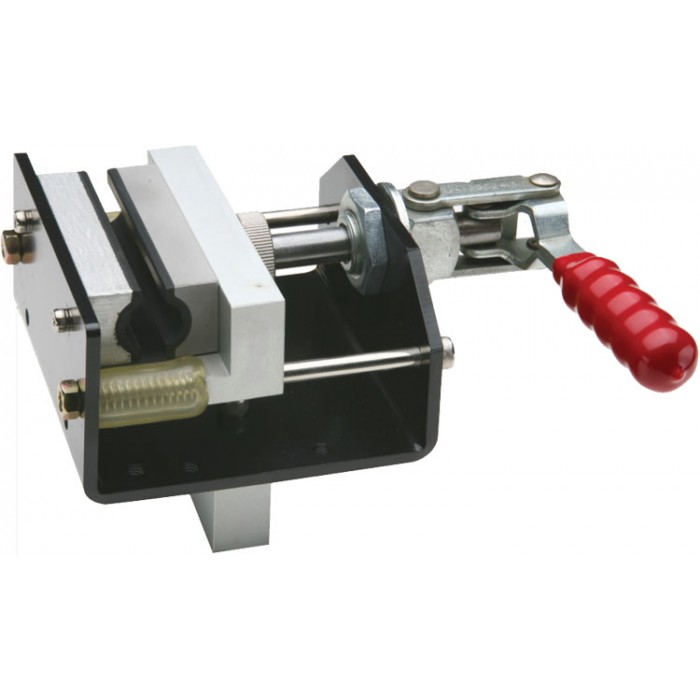
What are the best practices for maintaining aluminum collars in corrosive environments?
Maintaining aluminum collars in corrosive environments is crucial to ensure their longevity and optimal performance. Here are the best practices for proper maintenance:
- 1. Regular Inspection: Conduct routine inspections to identify any signs of corrosion or wear on the aluminum collars. Look for discoloration, pitting, or surface damage.
- 2. Material Selection: Ensure that the aluminum alloy used for the collars is corrosion-resistant. Select alloys with better resistance to corrosive agents, such as 6061 or 7075 aluminum, which offer good corrosion resistance properties.
- 3. Corrosion-Resistant Coatings: Consider using collars with specialized coatings or finishes that provide an additional layer of protection against corrosion. These coatings can include anodizing, which can improve resistance to environmental factors.
- 4. Proper Installation: Ensure that the collars are installed correctly and securely. Proper installation prevents gaps or openings that could allow corrosive agents to penetrate and damage the collar or the shaft.
- 5. Lubrication: Apply a compatible lubricant to the collar’s contact surface with the shaft. Lubrication reduces friction and can help protect against corrosion. Ensure that the lubricant is suitable for the specific environmental conditions.
- 6. Corrosion-Resistant Fasteners: If set screws or fasteners are used in collar installation, opt for corrosion-resistant materials such as stainless steel. This prevents galvanic corrosion between dissimilar metals.
- 7. Sealant and Gaskets: In highly corrosive environments, consider using sealants or gaskets to create a barrier between the collar and the corrosive elements. These components can help maintain the integrity of the collar’s seal.
- 8. Regular Cleaning: Clean the collars and surrounding components regularly to remove any accumulated contaminants. Use appropriate cleaning agents and methods that won’t harm the collar’s surface.
- 9. Environmental Monitoring: Continuously monitor the environmental conditions in which the collars operate. Make adjustments or modifications to the maintenance routine based on changes in the environment’s corrosive factors.
- 10. Replacement Schedule: Establish a replacement schedule for collars operating in particularly harsh or corrosive conditions. Regularly replace collars to prevent unexpected failures or deterioration in performance.
- 11. Consult with Experts: Seek advice from corrosion or materials experts when dealing with highly corrosive environments. They can provide guidance on the best practices and materials for your specific situation.
Proper maintenance of aluminum collars in corrosive environments extends their lifespan and ensures the continued reliability of your machinery and equipment. By following these best practices, you can mitigate the effects of corrosion and reduce the risk of premature collar failure.

Are there guidelines for lubricating and maintaining aluminum collars to ensure optimal performance?
Maintaining and lubricating aluminum collars is essential to ensure their optimal performance and longevity. Here are guidelines for proper lubrication and maintenance:
- 1. **Cleaning:** Start by cleaning the collar and the shaft to remove any dirt, debris, or residue. Use a non-abrasive cloth or cleaning solution if necessary. Clean collars are easier to work with and less prone to wear and tear.
- 2. **Lubrication: Apply a suitable lubricant to the contact points between the collar and the shaft. The lubricant reduces friction and wear, ensuring a secure fit. Be sure to use a lubricant compatible with aluminum and the specific application.
- 3. **Proper Tightening: If you’re using set screw collars, ensure that you tighten the set screws evenly and to the manufacturer’s recommended torque specifications. Avoid over-tightening, which can damage the collar or shaft.
- 4. **Regular Inspection: Periodically inspect the collars for signs of wear, damage, or misalignment. Replace any collars that show significant wear, as they may no longer provide a secure grip.
- 5. **Environmental Considerations: Take into account the environmental conditions of your application. If the collars are exposed to moisture or corrosive substances, select a lubricant that provides corrosion protection. For high-temperature applications, choose a high-temperature lubricant.
- 6. **Reapplication of Lubricant: In applications with frequent movement or high loads, reapply lubricant as needed to maintain optimal performance. Regularly re-lubricate moving parts for smooth operation.
- 7. **Alignment: Ensure that the collar is properly aligned with the shaft and other components. Misalignment can cause uneven stress and premature wear. Make any necessary adjustments for proper alignment.
- 8. **Storage: If collars are not in use, store them in a clean and dry environment. Avoid exposure to extreme temperatures or humidity, which can affect the performance and condition of the collars.
- 9. **Documentation: Keep records of maintenance, including the date of lubrication and any replacements. This helps in scheduling regular maintenance and identifying patterns of wear or issues.
- 10. **Consult Manufacturer’s Recommendations: Always refer to the manufacturer’s guidelines and recommendations for specific maintenance procedures and compatible lubricants. Following the manufacturer’s instructions is crucial for optimal performance and warranty compliance.
Proper maintenance and lubrication of aluminum collars not only extend their service life but also ensure the safety and efficiency of your mechanical systems. Regular inspections and maintenance routines can prevent premature wear and potential failures.
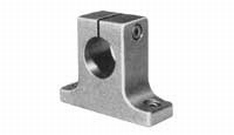
What are the key differences between aluminum collars and other collar materials like stainless steel?
Understanding the differences between aluminum collars and other materials like stainless steel is essential when selecting the right collar for your application. Here are the key distinctions:
| Characteristic | Aluminum Collars | Stainless Steel Collars |
|---|---|---|
| Weight | Aluminum collars are lightweight, making them ideal for applications where weight reduction is crucial. | Stainless steel collars are heavier than aluminum collars, which can be advantageous in some high-stress applications. |
| Corrosion Resistance | Aluminum has natural corrosion resistance due to its oxide layer. It’s suitable for indoor and outdoor applications but may not be ideal for highly corrosive environments. | Stainless steel is known for its excellent corrosion resistance, making it suitable for a wide range of applications, including those exposed to harsh chemicals and saltwater. |
| Machinability | Aluminum is relatively easy to machine, making it suitable for custom collar designs. Machining and fabricating aluminum collars is straightforward. | Stainless steel can be more challenging to machine due to its hardness, but it’s still machinable. Special tools and expertise may be required. |
| Strength | Aluminum collars are less strong than stainless steel collars. They are suitable for applications where high strength is not a primary requirement. | Stainless steel collars offer higher strength and durability, making them suitable for high-stress and heavy-load applications. |
| Magnetic Properties | Aluminum is non-magnetic, making it ideal for applications where magnetic interference is a concern. | Stainless steel can be magnetic or non-magnetic, depending on its composition. This property should be considered in applications sensitive to magnetic fields. |
| Cost | Aluminum collars are generally more cost-effective than stainless steel collars, making them a budget-friendly choice. | Stainless steel collars are often more expensive due to their higher material cost and manufacturing complexity. |
The choice between aluminum and stainless steel collars depends on the specific requirements of your application. Consider factors such as weight, corrosion resistance, strength, and budget constraints when making your selection. It’s essential to select the material that best aligns with the needs of your mechanical application.


editor by Dream 2024-04-23
China Professional Stainless Steel Jaw Coupling Transmission Flexible Shaft Coupling for Motor square shaft collar
Product Description
| Material: | Stainless steelSS201,SS303,SS304,SS316,SS416,SS420,17-4PH,SUS440C |
| AluminumAL2571,AL5754(Almg3),AL5083,AL6061,AL6063,AL5052,AL7075 | |
| Carbon steelQ235,S235JR,1571, 1015, 1571, 1571, 1030, 1035, 1040, 1045 | |
| Alloy steel40Cr,15CrMo,4140,4340,35CrMo,16MnCr5 | |
| Brass/Copper/BronzeC11000, C15710, C12000, C26000, C36000, etc.etc… | |
| Stainless Steel (201, 302, 303, 304, 316, 420, 430) etc… | |
| Steel (mild steel, Q235, 20#, 45#) etc… | |
| Process: | CNC Machining, turning,milling, lathe machining, boring, grinding, drilling,broaching, stamping,etc… |
| Surface treatment: | Clear/color anodized; Hard anodized; Powder-coating;Sand-blasting; Painting; |
| Nickel plating; Chrome plating; Zinc plating; Silver/gold plating; | |
| Black oxide coating, Polishing etc… |
ZheZheJiang nlead Precision Co., Ltd. which focuses on CNC machining, including milling, turning, auto-lathe turning,holing,grinding, heat treatment from raw materials of bars, tube, extruded profiles, blanks of cold forging & hot forging, aluminum die casting.
We provide one-stop service, from professional design analysis, to free quote, fast prototype, IATF16949 & ISO14001 standard manufacturing, to safe shipping and great after-sales services.During 16 years, we have win lots of trust in the global market, most of them come from North America and Europe.
Now you may have steady customers, and hope you can keep us in the archives to get more market news.
Sunlead produce all kinds of machining parts according to customer’s drawing, we can produces stainless steel Turned parts,carbon steel Turned parts, aluminum turned parts,brass & copper turned parts.
Please feel free to send inquiry to us, and our professional sales manager will get back to you ASAP!
Q1: How can I get the samples?
A: If you need some samples to test, you should pay for the transportation freight of samples and our samples cost.
Q2: Can we have our marking,Logo or company name to be printed on your products or package?
A: Sure. Your marking,logo,or company name can be put on your products by Laser machine
Q3: How to order?
A: Please send us your purchase order by Email, or you can ask us to send you a Performa invoice for your order. We need to know the following information for your order.
1) Product information-Quantity, Specification ( Size, Material, Technological and Packing requirements etc.)
2) Delivery time required
3) Shipping information-Company name, Street address, Phone&Fax number, Destination sea port.
4) Forwarder’s contact details if there’s any in China.
Q4: When can you get the price?
We usually quote within 48 hours after we get your inquiry. If you are very urgent to get the price, please call us or tell us in your email so that we will regard your inquiry priority. Kindly note that if your inquiry is with more details then the price we quote will be more accurate.
Q5: How can you get a sample to check our quality?
After price confirmation, you can require for samples to check our quality.
Q6: What kind of files do we accept for drawing?
A: PDF, CAD,STP,STEP
Q7: What about the lead time for mass production?
Honestly, it depends on the order quantity and the season you place the order. Generally speaking,it would need about 30-60days to finish the sample.
Q8: What is our terms of delivery?
We accept EXW, FOB, CFR, CIF, DDU, DDP, etc. You can choose the 1 which is the most convenient or cost effective for you.
| Application: | Fastener, Auto and Motorcycle Accessory, Hardware Tool, Machinery Accessory |
|---|---|
| Standard: | GB, EN, China GB Code |
| Surface Treatment: | as Requiried |
| Production Type: | Mass Production |
| Machining Method: | CNC Machining |
| Material: | Steel, Brass, Alloy, Copper, Aluminum, Iron |
| Customization: |
Available
| Customized Request |
|---|
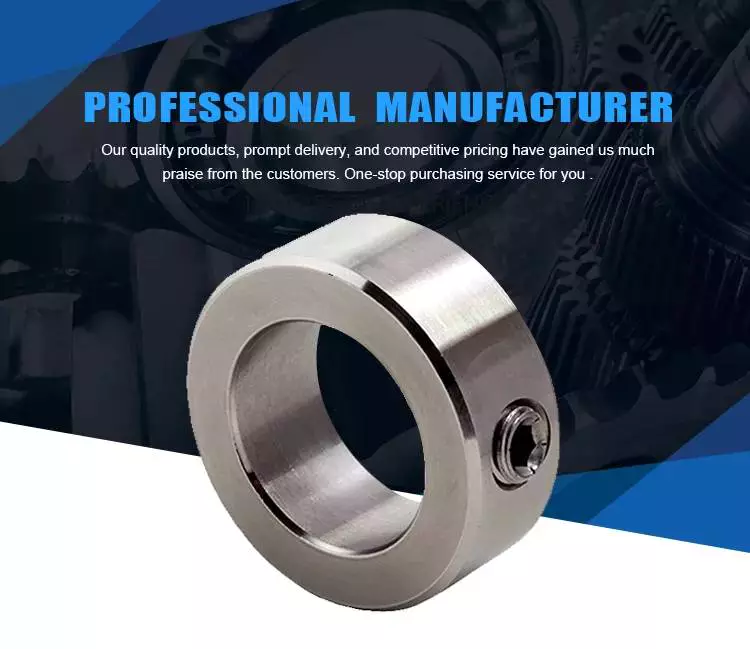
Types of Shaft Collars
Clamp style shaft collars
A variety of styles of shaft collars are available for your machining needs. Clamp style shaft collars offer better flexibility and hold better than set screw collars. They are best for shaft materials that are softer than a setscrew. Clamp style collars are generally easier to maneuver, as they are two-piece and are hinged along the shaft.
Clamp style shaft collars come in two-piece and one-piece designs. One-piece clamp collars are typically used for a single-piece shaft, while two-piece clamp collars are used for multiple shafts. The one-piece clamp collar provides a more uniform holding force, while two-piece clamp collars provide more clamping force and can be installed anywhere on the shaft. Both styles are available in English and metric measurements.
The holding power of Clamp style shaft collars depends on their bore size and concentricity. The fastening hardware also affects torque transmission. Forged screws are generally stronger than broached screws, and are less likely to ream out. However, you still need to make sure that the material of the collar is strong enough to withstand the recommended screw torque.
Clamp style shaft collars are available in 1215 lead-free steel with a black oxide finish and zinc plating, as well as 303 and 316 stainless steel. They are also available in 2024 aluminum with an anodized finish. They are available in a range of sizes from 1/8” to six inches and 3mm to 150mm.
One of the main benefits of Clamp style shaft collars is their versatility. The collars can be used as guides, spacers, or stops on a variety of medical equipment. They are designed to distribute compression forces around a shaft, and they can be added at any stage in the manufacturing process.
Set screw shaft collars
Set screw shaft collars are used to secure screws to shafts. They can be purchased in a variety of sizes. The external diameter, internal diameter, and width of the collar will determine the proper collar size. Some companies also offer custom and adjustable-width collars. Clamp-style shaft collars are easier to maintain, and distribute torque evenly across the shaft. They also offer twice the holding power of set screw collars.
Collars are available in metric and inch sizes. They are also available in zinc plated and black-oxide steel. In addition, they come in a variety of styles. Whether you’re looking for a custom collar, or something a little more conventional, you can find it with the help of an ISO-certified supplier.
Set screw shaft collars come in different sizes and materials. Socket collars, for example, are made of steel and have an inside diameter of 5/64″ to 1-1/8″. In addition, forged socket set screw shaft collars come in 3/16 to 4 in. They are also available with special hardware for connection to shafts.
Set screw shaft collars are commonly used on transmission and machinery. A set screw allows you to secure the collar in position by setting it into the correct position with a grub screw or a set screw. The set screw can then be adjusted with a screw driver and is a quick and easy solution for keeping a shaft in place.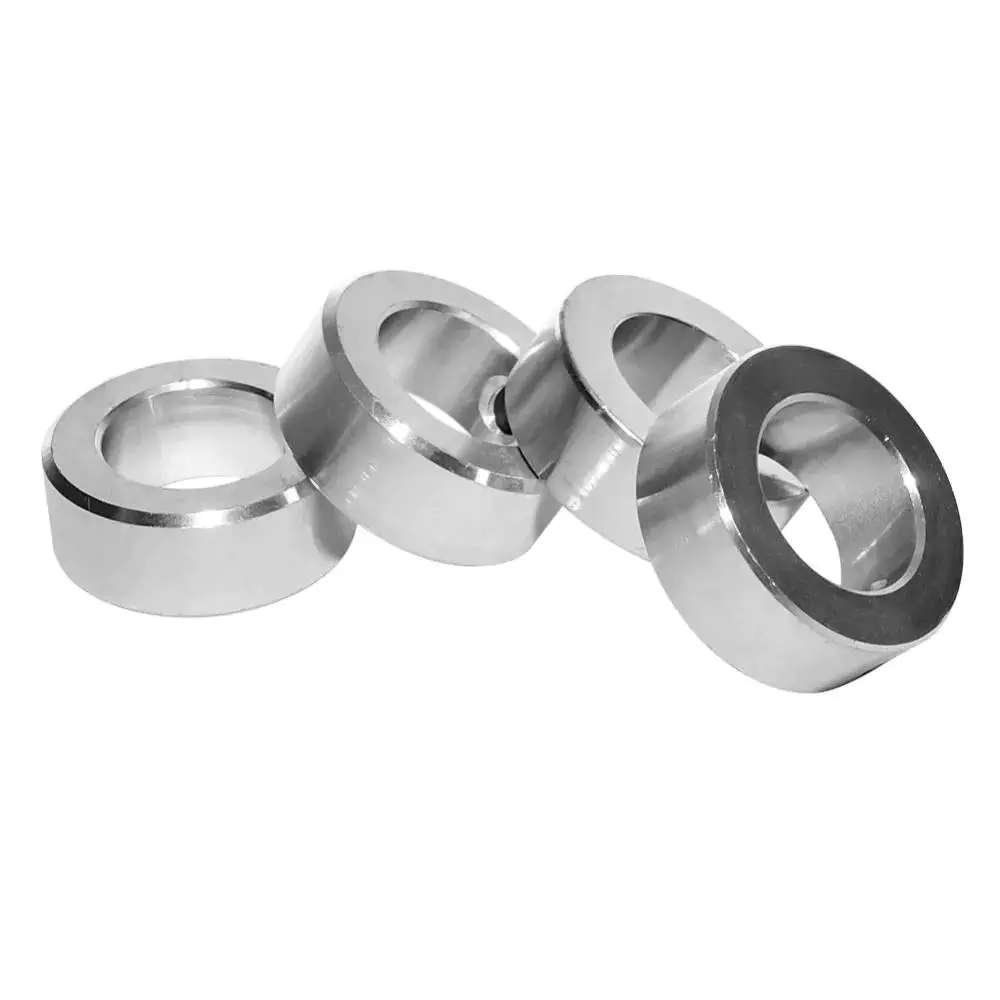
Aluminum shaft collars
Aluminum shaft collars offer a number of advantages, ranging from their light weight to their corrosion resistance. Aluminum shaft collars are available in various styles and sizes, and can be plated with a variety of finishes. They are also available in lightweight styles for applications with tight space constraints. The most important factor when selecting a shaft collar is the material used to make it. Aluminum is lighter than steel and has a high strength to weight ratio. The choice of material should also depend on how much corrosion resistance is required. For example, if the shaft will be exposed to extreme environments, it is a better choice to use treated steel.
Another benefit to aluminum shaft collars is their ability to be custom-matched to the shaft. This feature helps to increase their aesthetics and branding potential. In addition, the ability to color-code components and switches can improve safety. This is especially useful in fail-safe applications. By incorporating color-coded collars, manufacturers can increase the safety of their products.
Another advantage of aluminum shaft collars is their strength. For instance, they can withstand higher torque levels than other types of shaft collars. They can be easily adjusted, and their two-piece design makes them easy to replace. Moreover, CZPT keeps the two-piece collars together during manufacturing, ensuring a perfect fit for the shaft. These collars also feature forged steel socket screws for enhanced holding power and torque capacity.
Single-piece shaft collars are also available in various styles. The set screw type has a perpendicular outer face. The set screw in these collars is used to engage the mating shaft. This type of shaft collar is a good choice for rotating assemblies.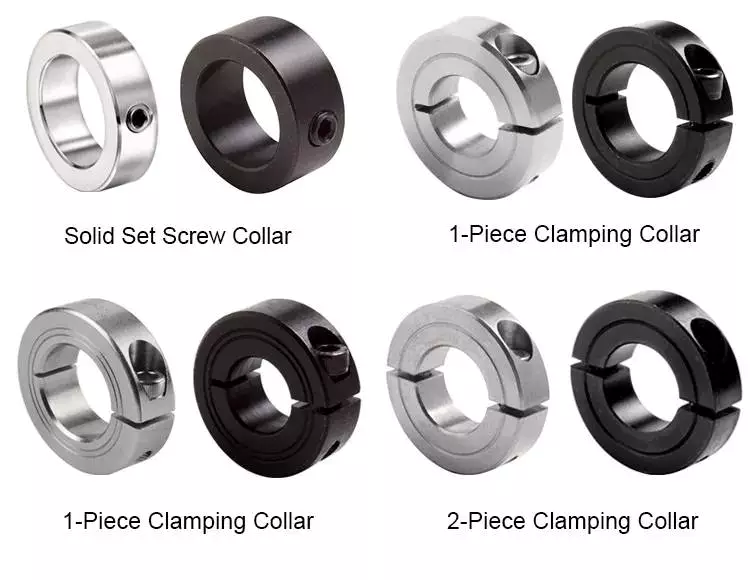
Stainless steel shaft collars
The main function of a stainless steel shaft collar is to provide clamping force to a rotating shaft. This is achieved by a variety of methods. One of these is by bending or hammering. A shaft collar can also be made of aluminum or a combination of both. These options provide different advantages, which are described in this article.
Stainless steel shaft collars are available in different sizes, shapes, and materials. The diameter of the shaft collar may range from five-sixteenths to two-and-a-half inches. Some manufacturers produce the collars in different materials, including T304, T316, 416, and 17-4PH. Their products may also come in various shapes, such as angles, flats, structural shapes, and threaded rods.
One of the most important advantages of a stainless steel shaft collar is its strength and durability. A well-made collar can prevent wear and tear and provide excellent holding power. It also has many applications and is useful in many industries. Its application ranges from vertical conveyors to horizontal athletic equipment machinery, from agriculture to retail.
While there are numerous types of shaft collars, all three types have some common characteristics. Typically, steel shaft collars have high holding power and slim to average profiles. Heavy-duty collars have twice the holding power of low-profile collars and are used in heavy-duty construction and mining. Ultra Heavy-Duty shaft collars have the highest axial holding power and are made of steel. Shaft collars may be treated with zinc for corrosion resistance.
One manufacturer offers stainless steel shaft collars made of 303 stainless steel and other materials. It offers collars of various diameters from three-eighth to one-eighth inch. They are available in threaded, mounting, and heavy-duty styles, and are suitable for a wide range of applications, including the aerospace, energy, and medical industries.

editor by CX 2023-05-30